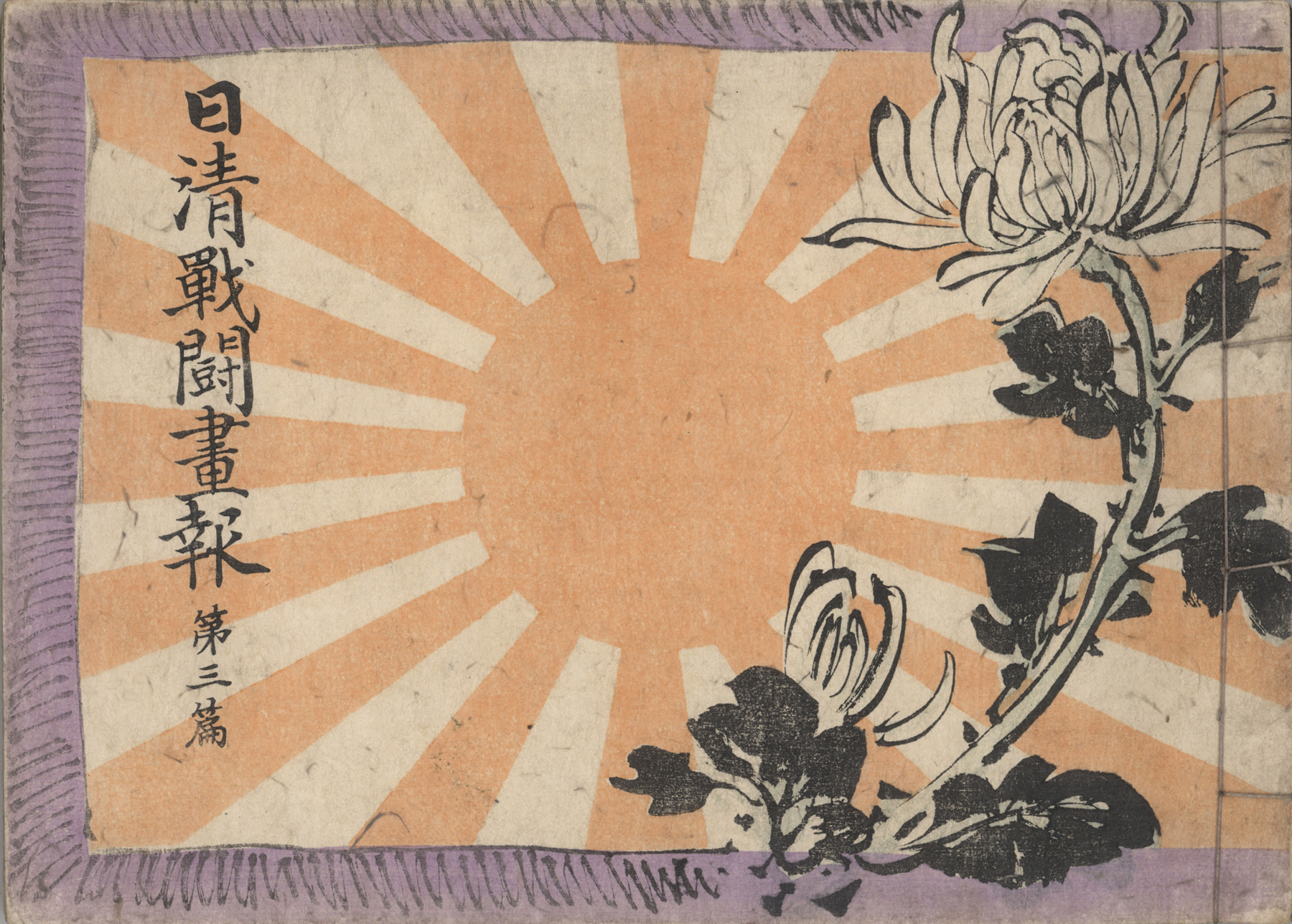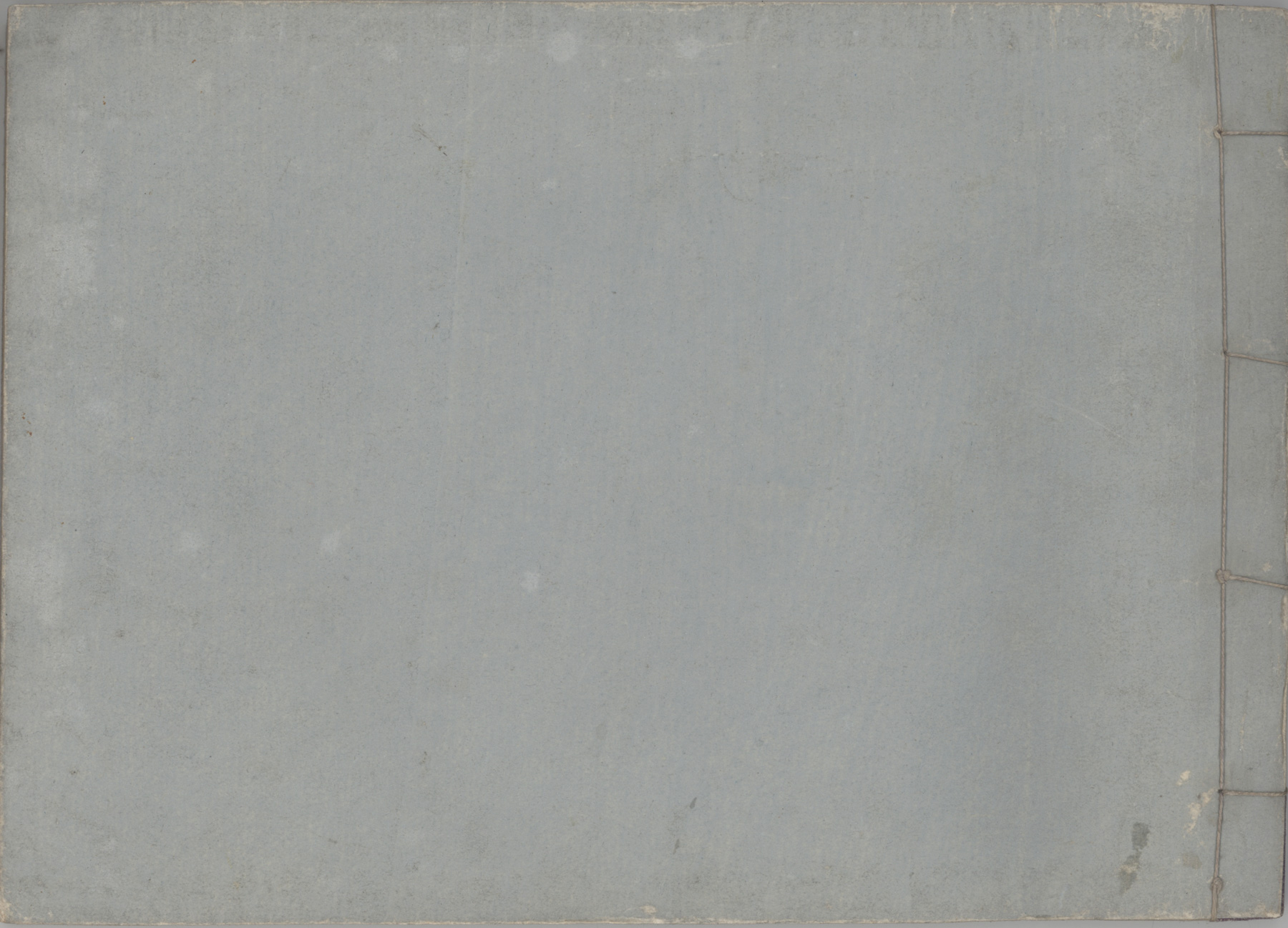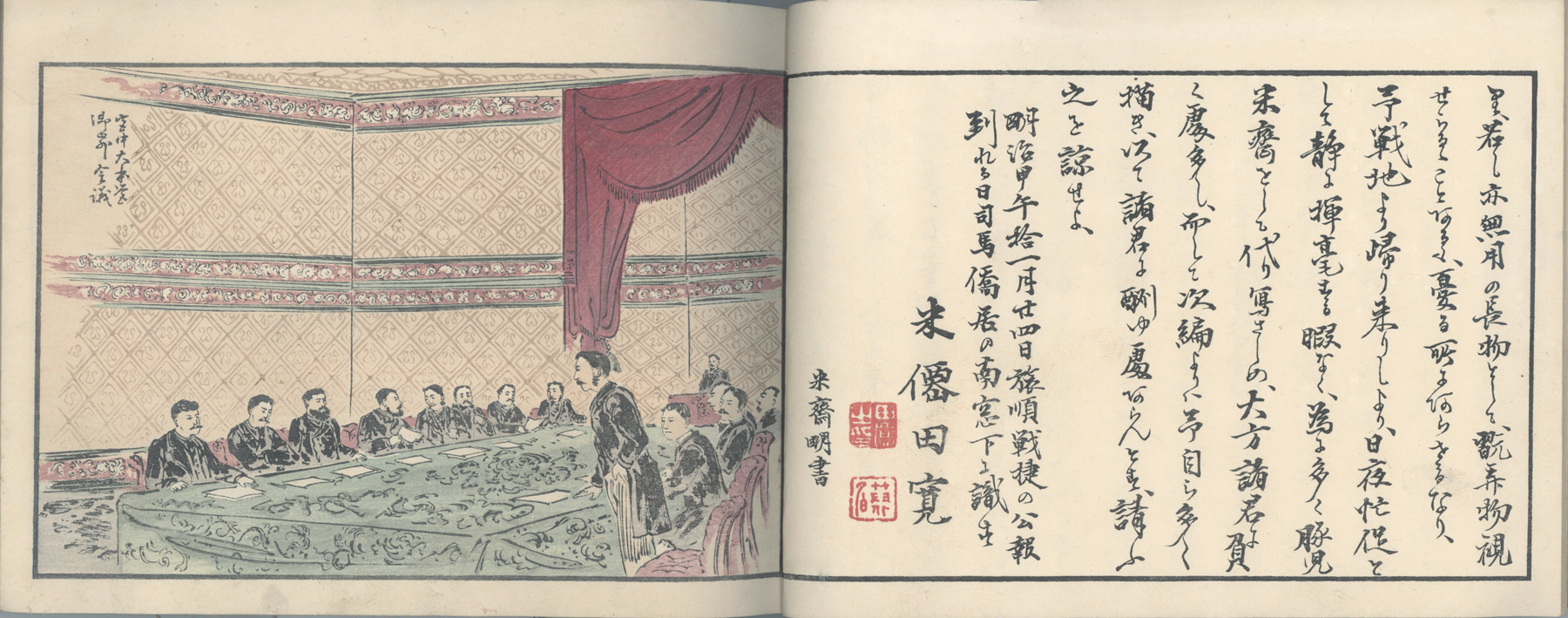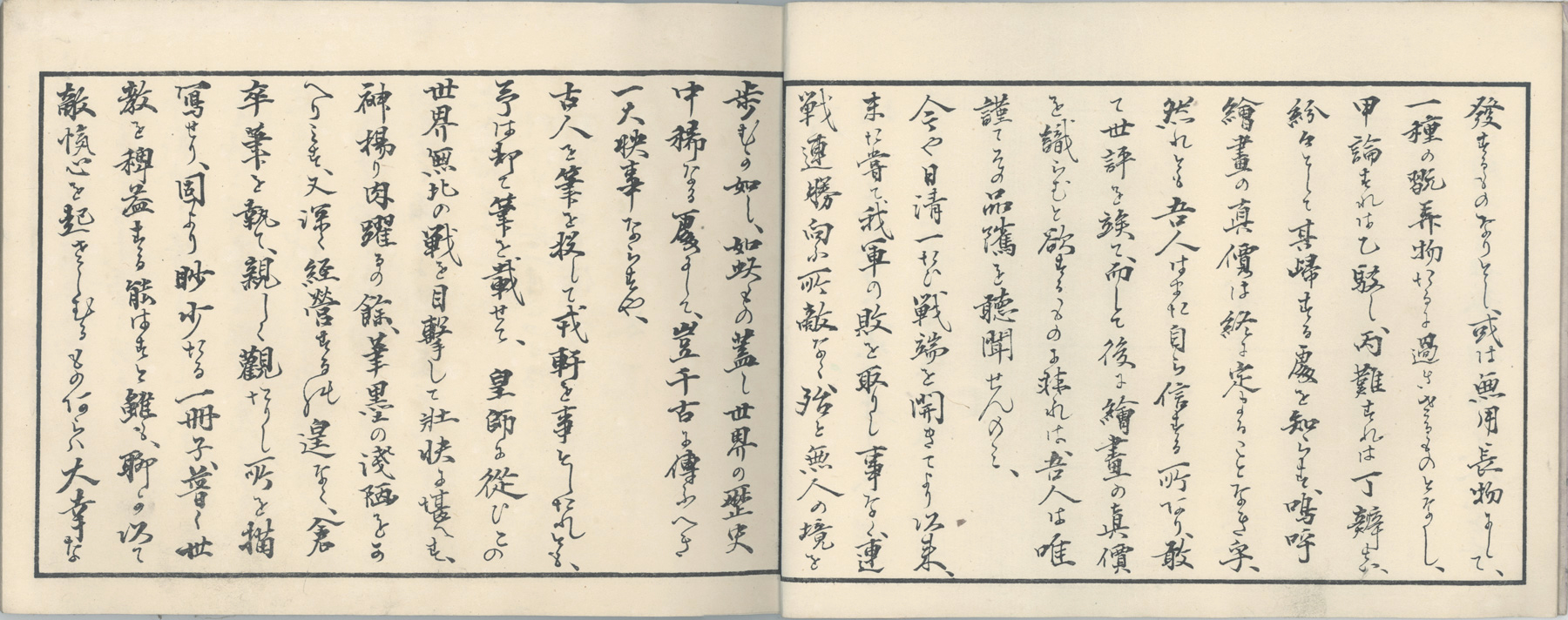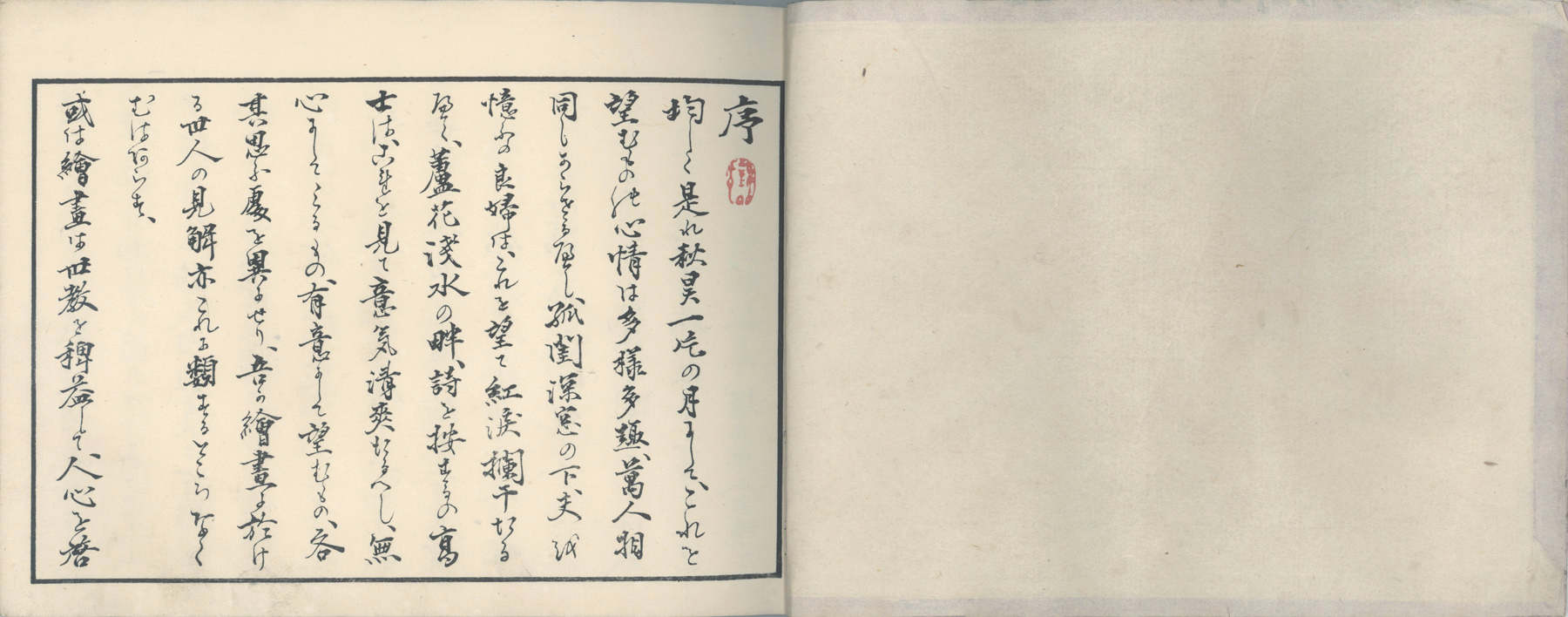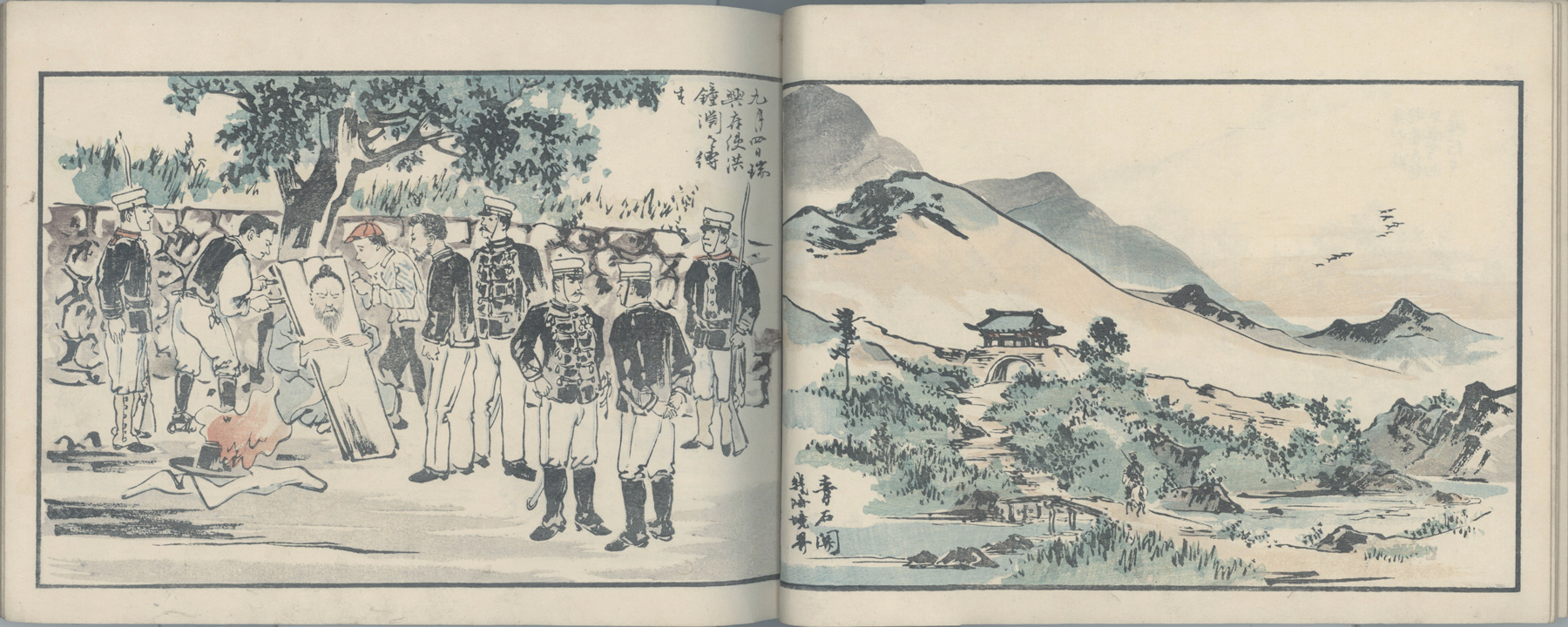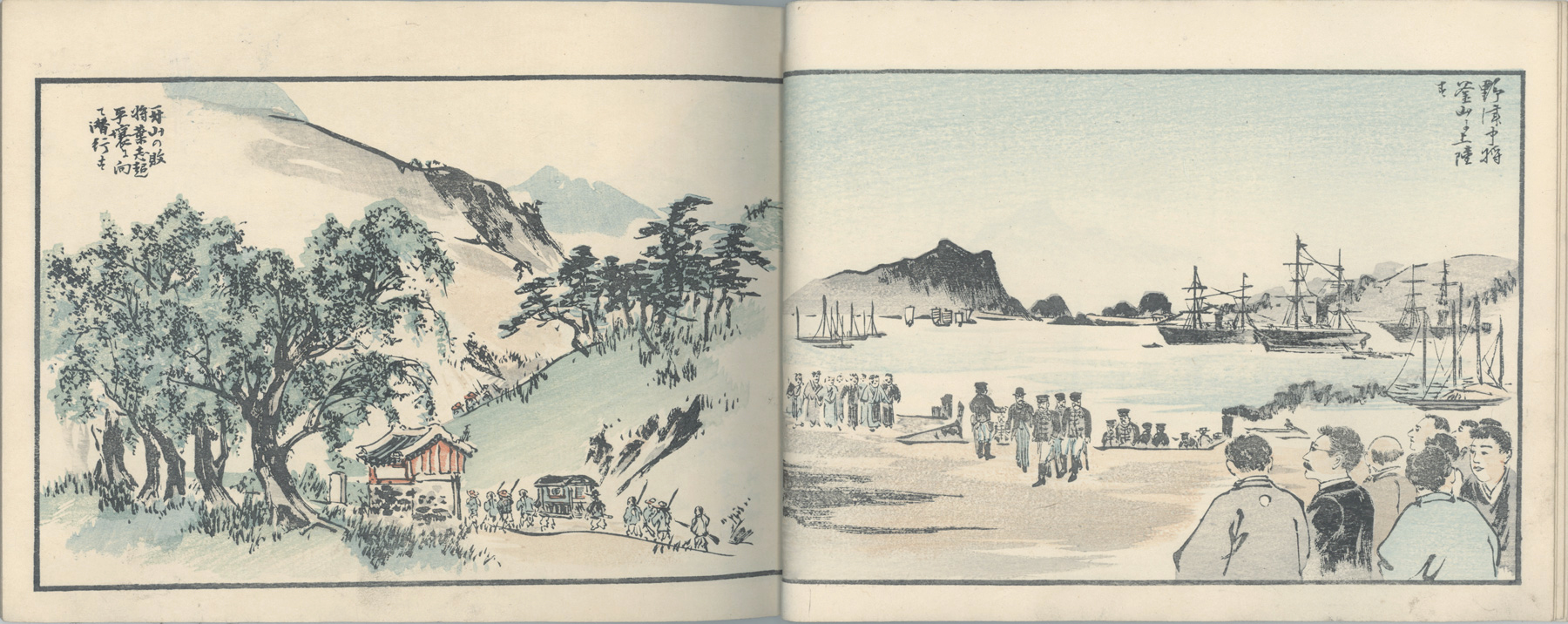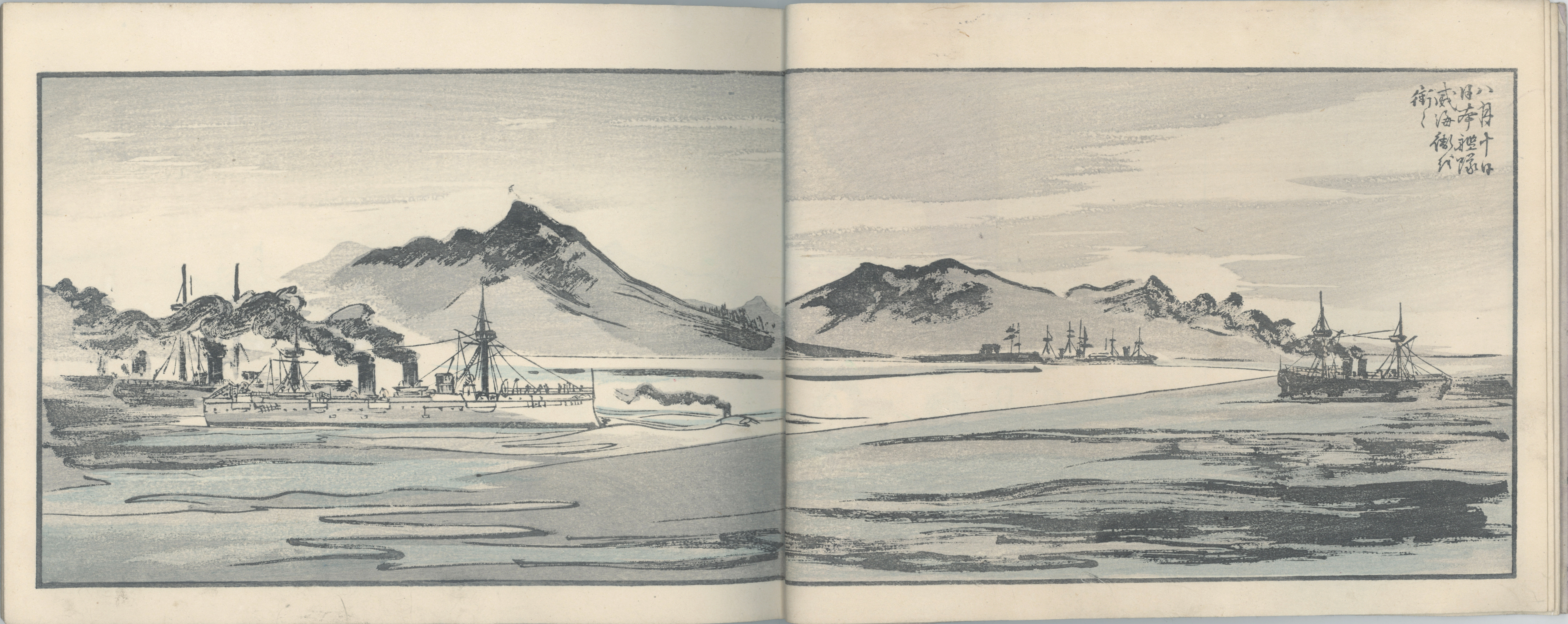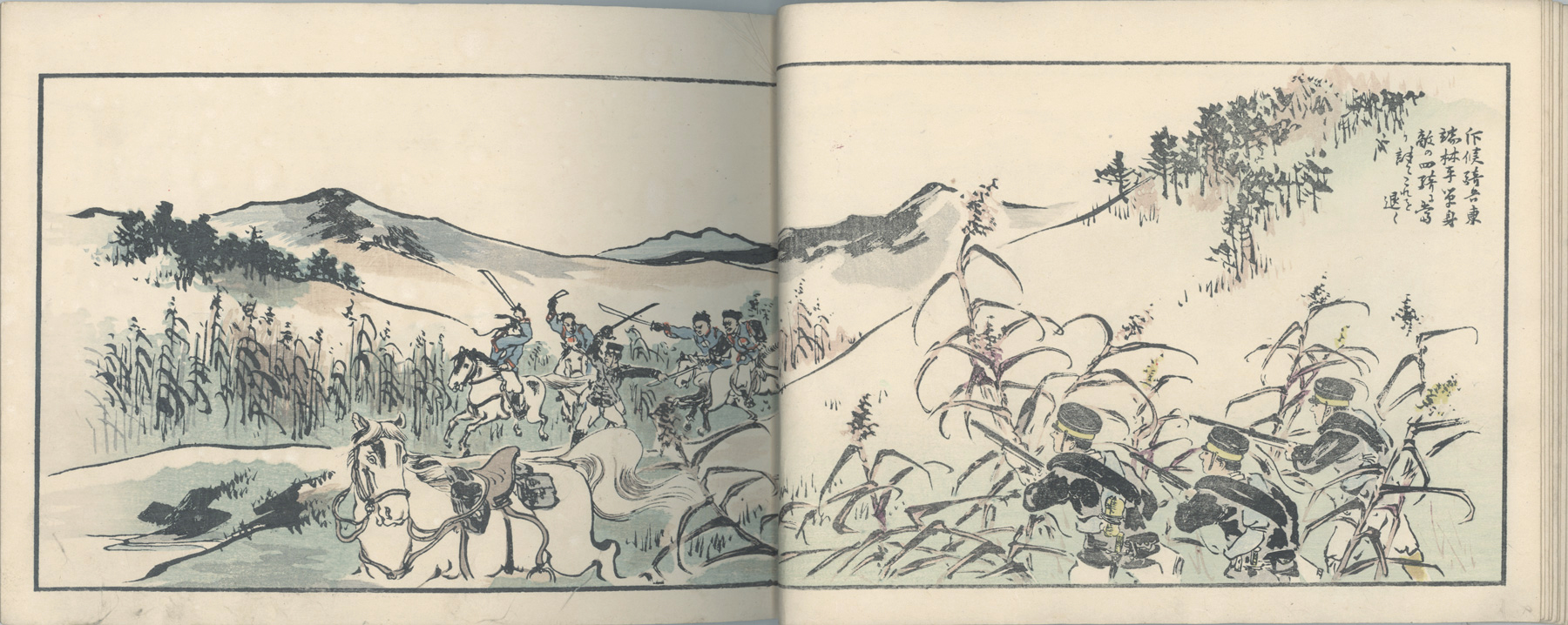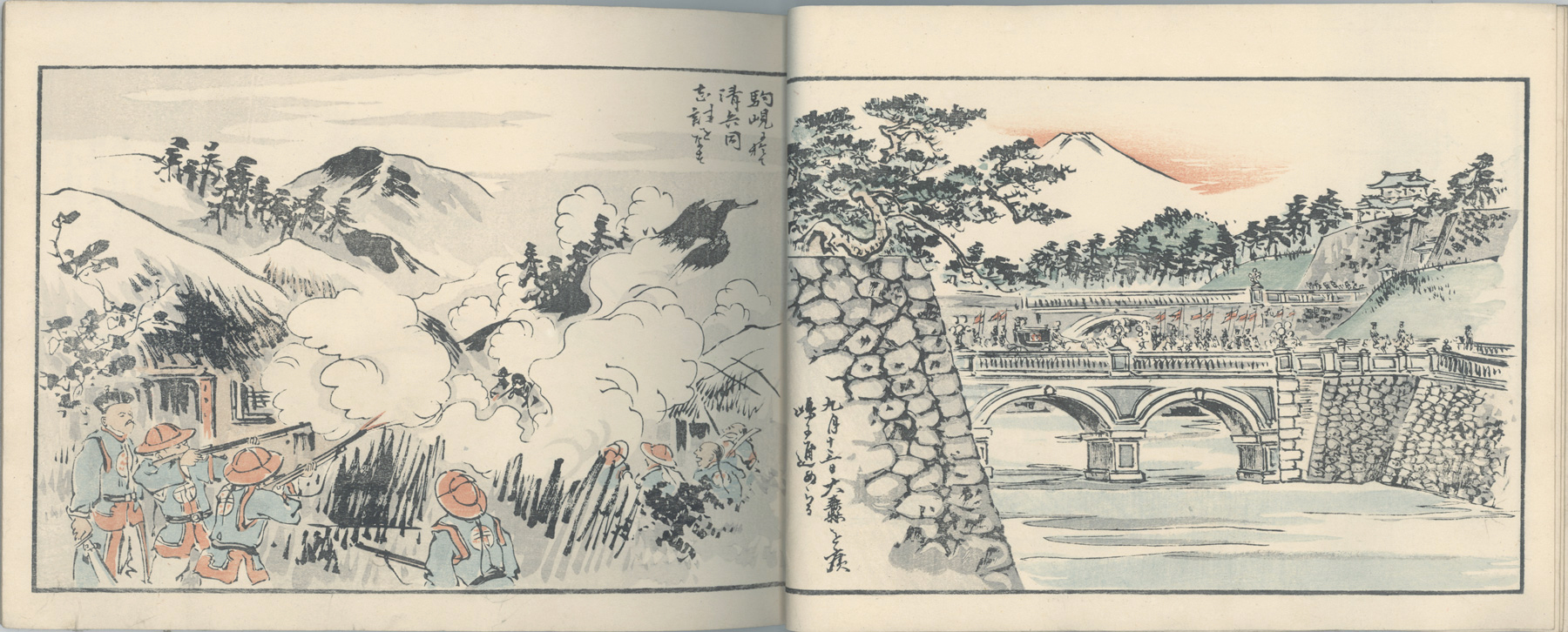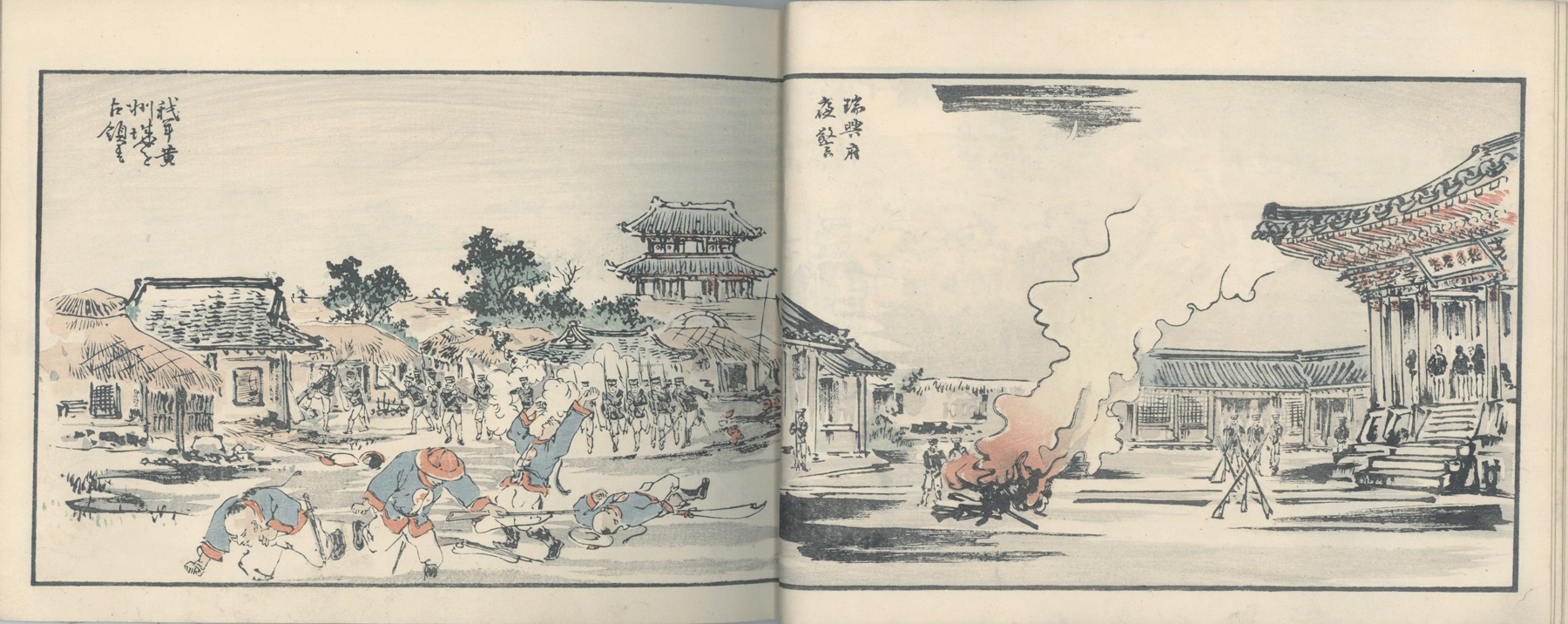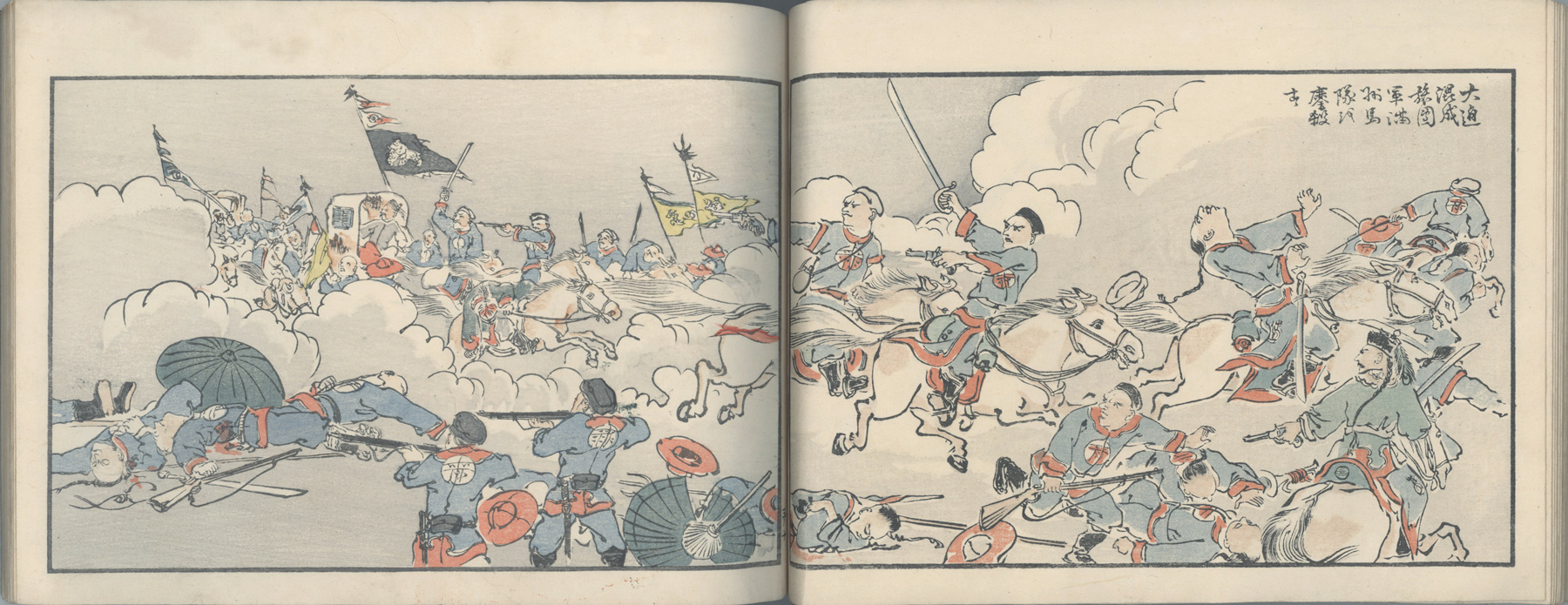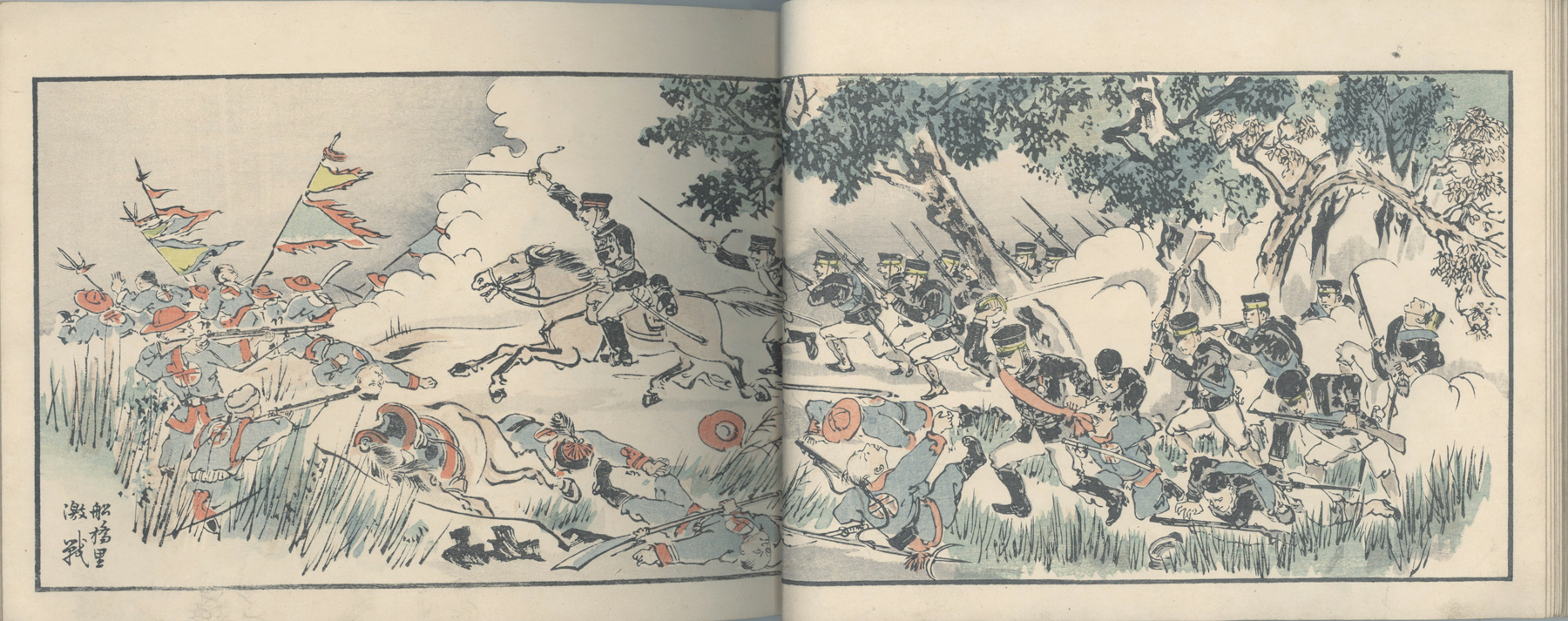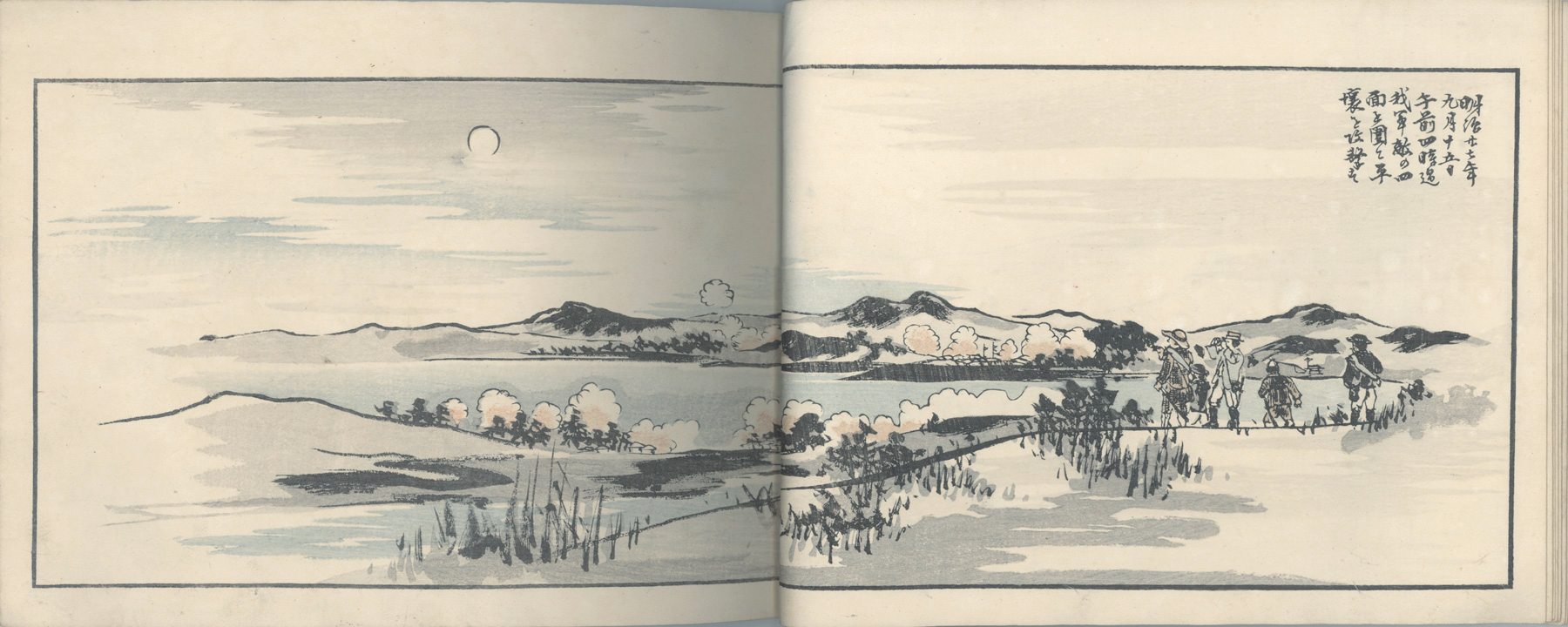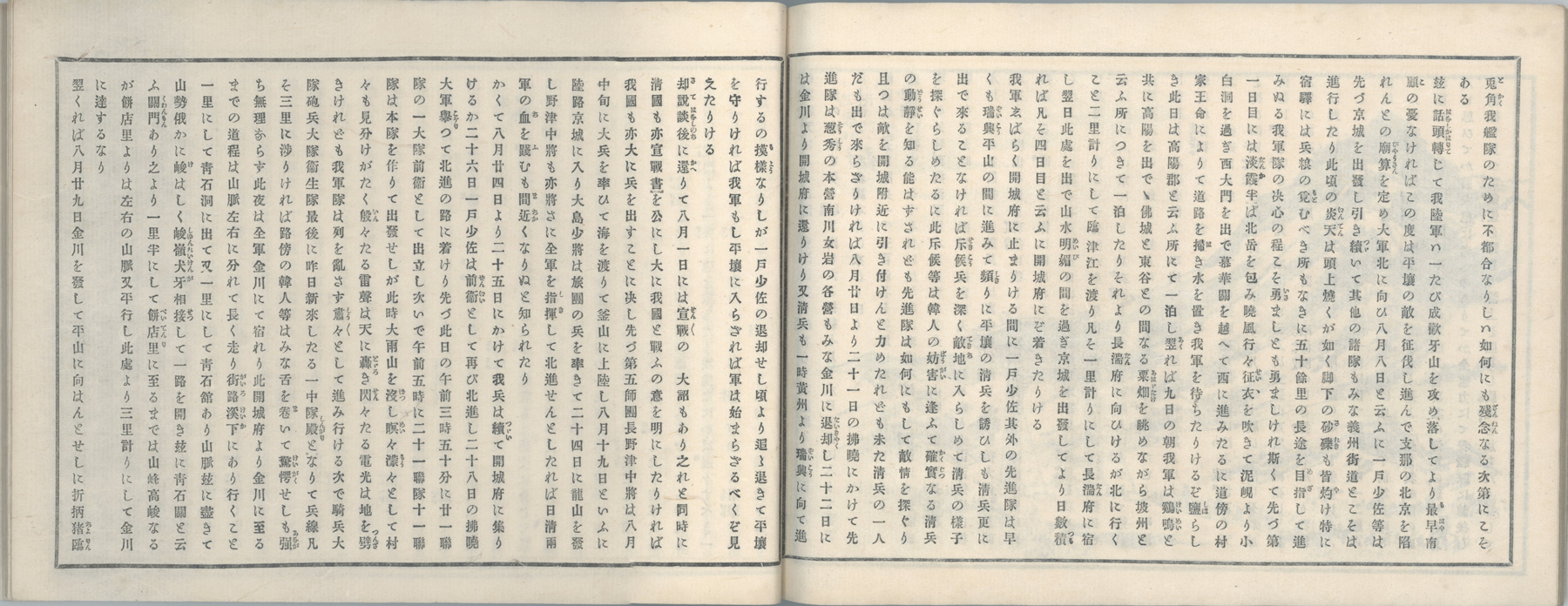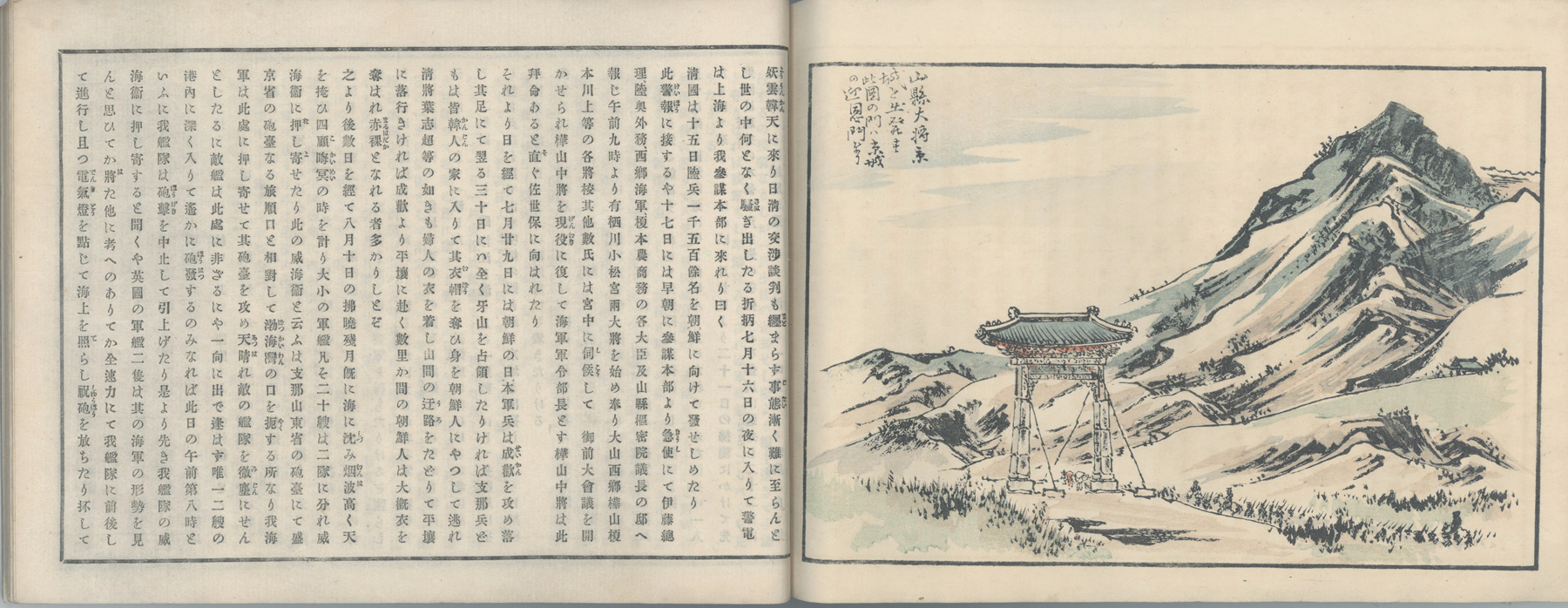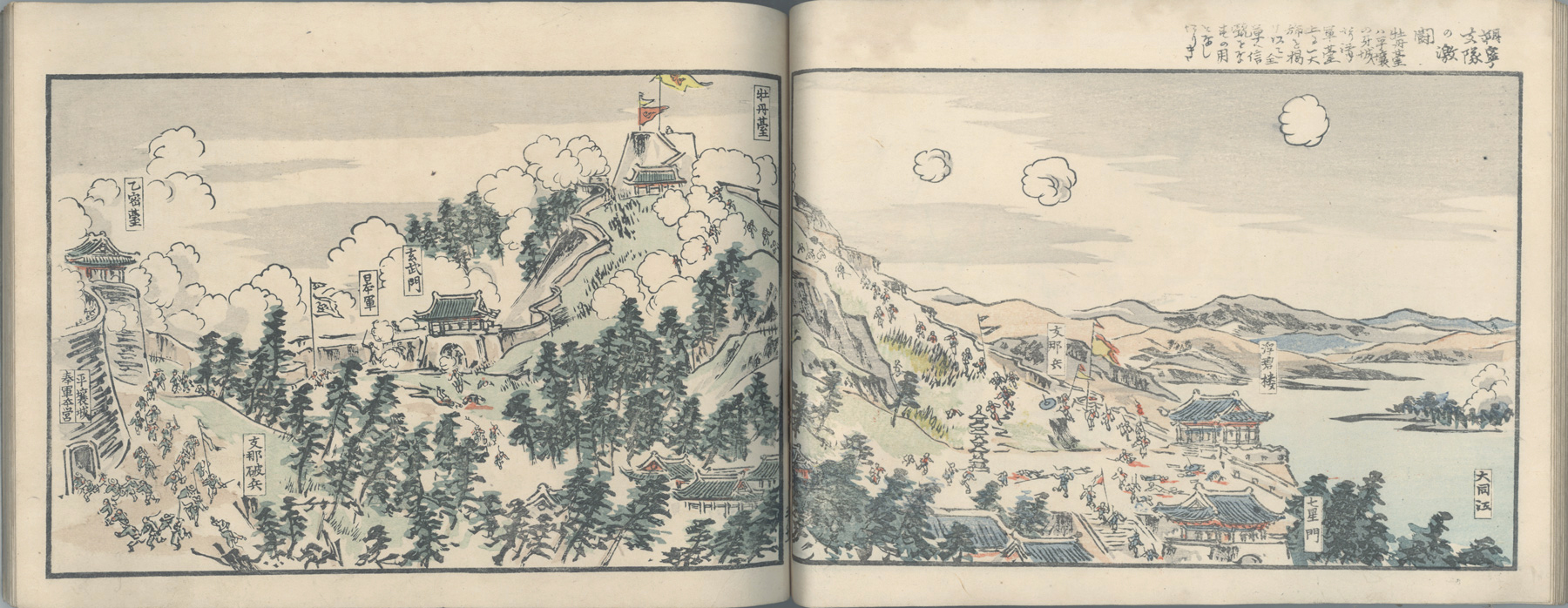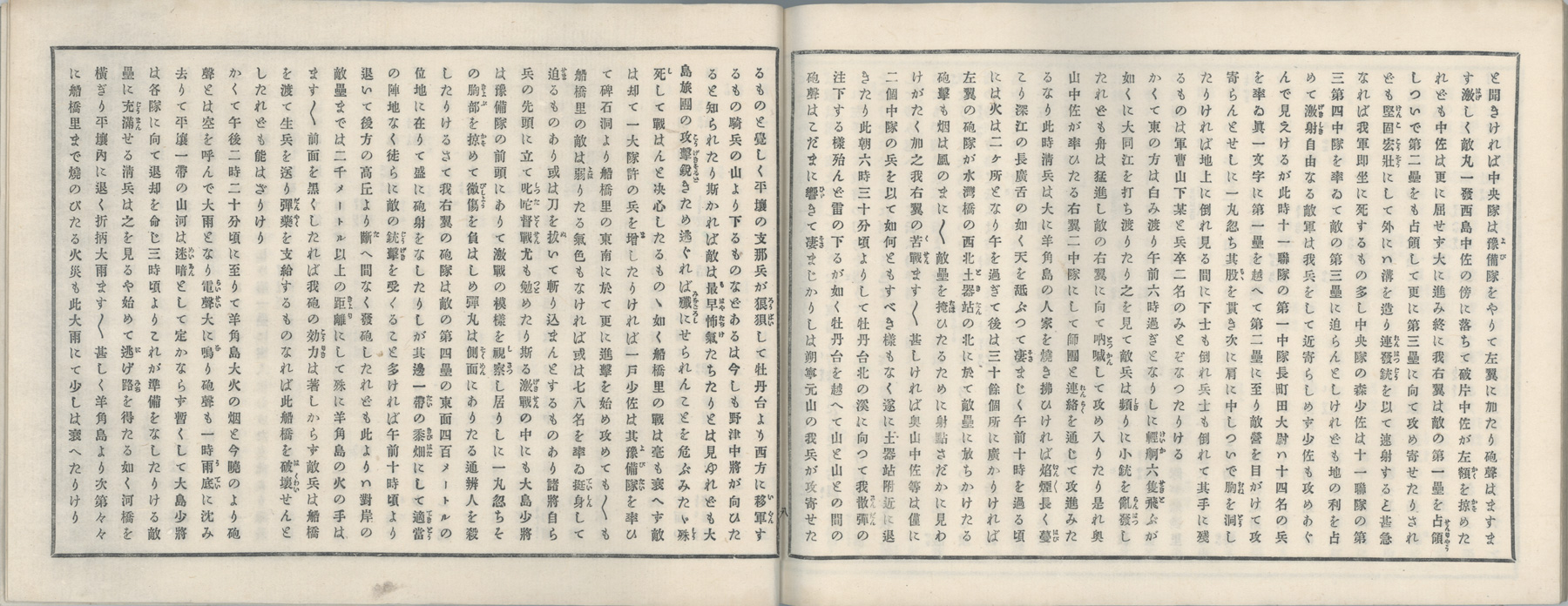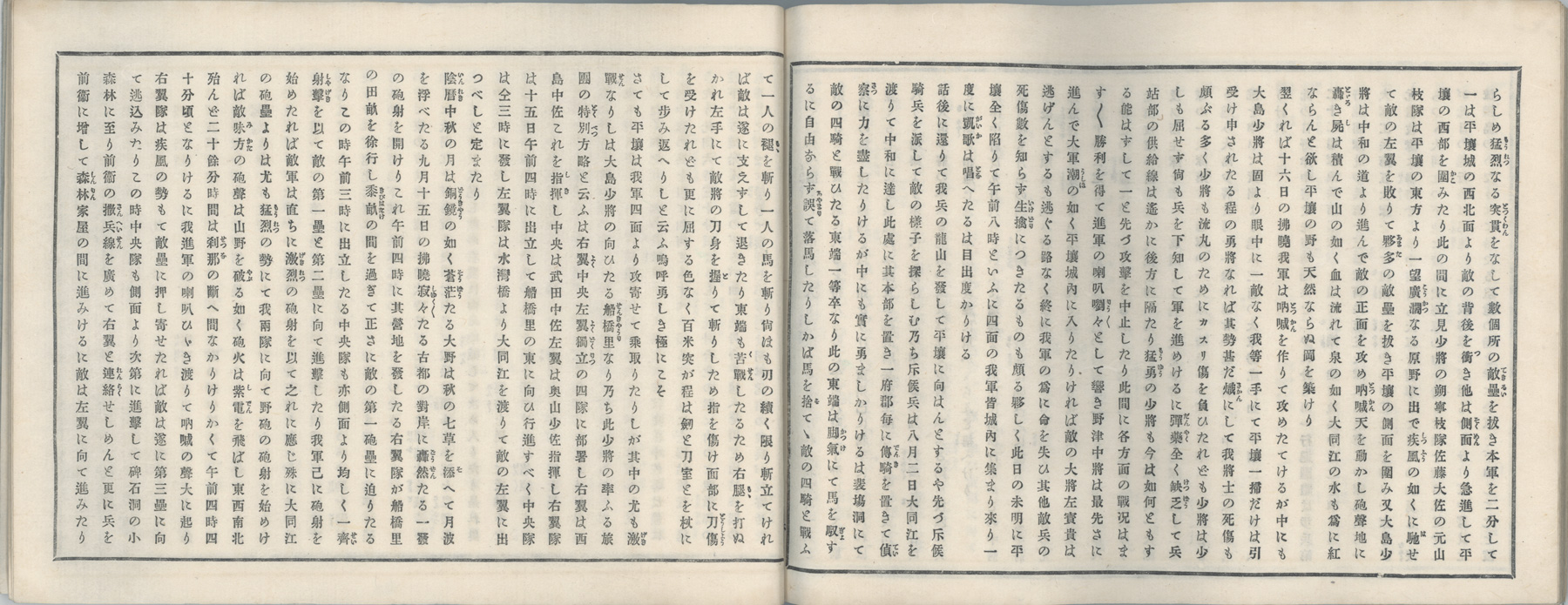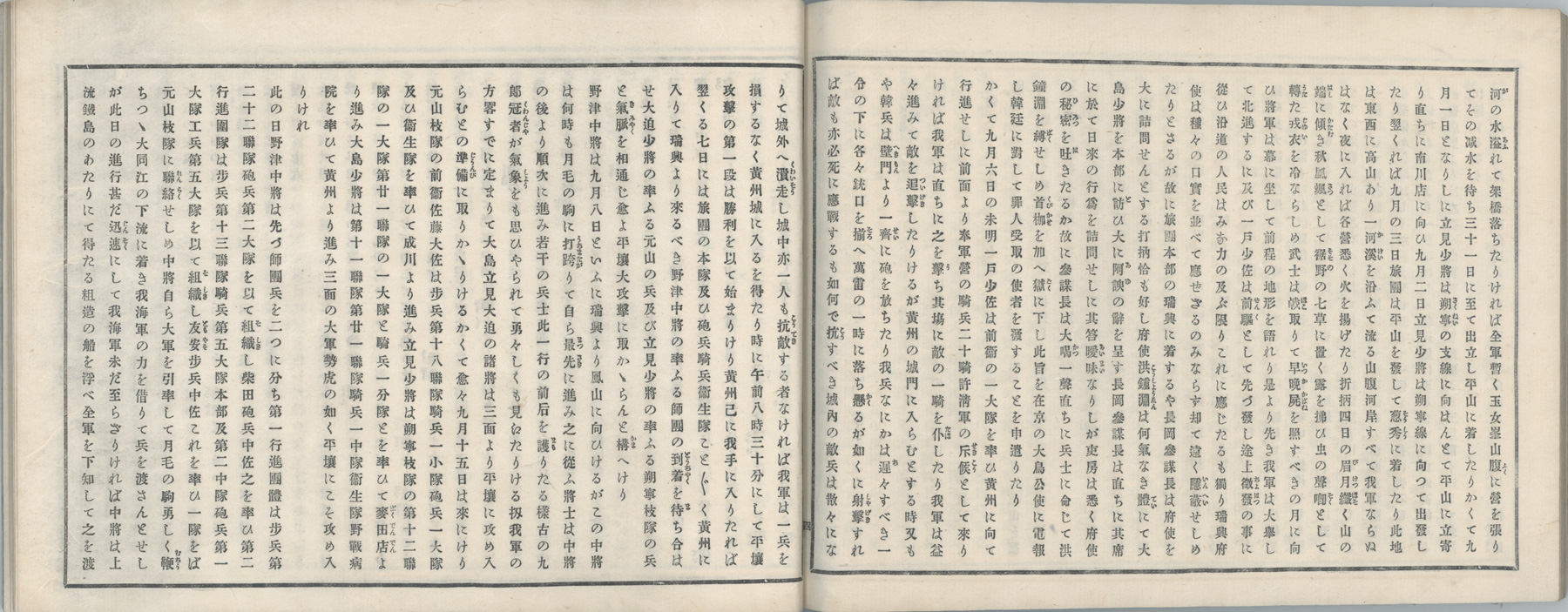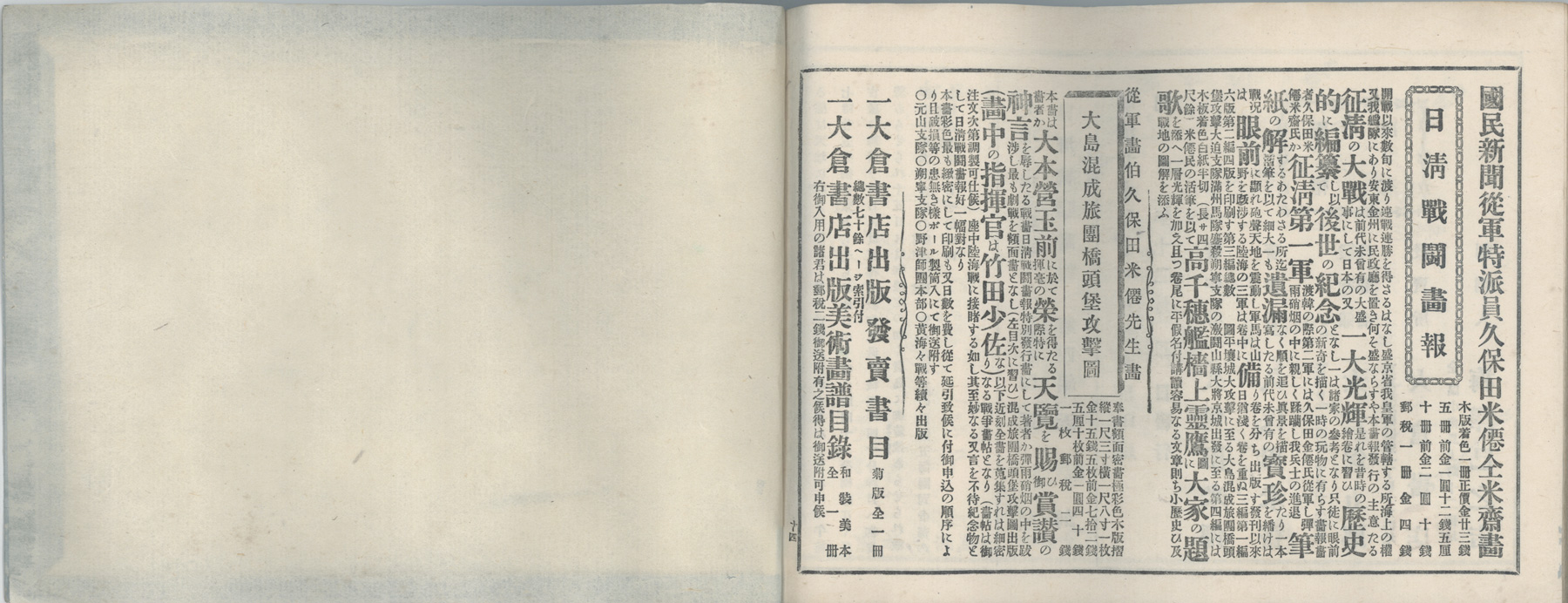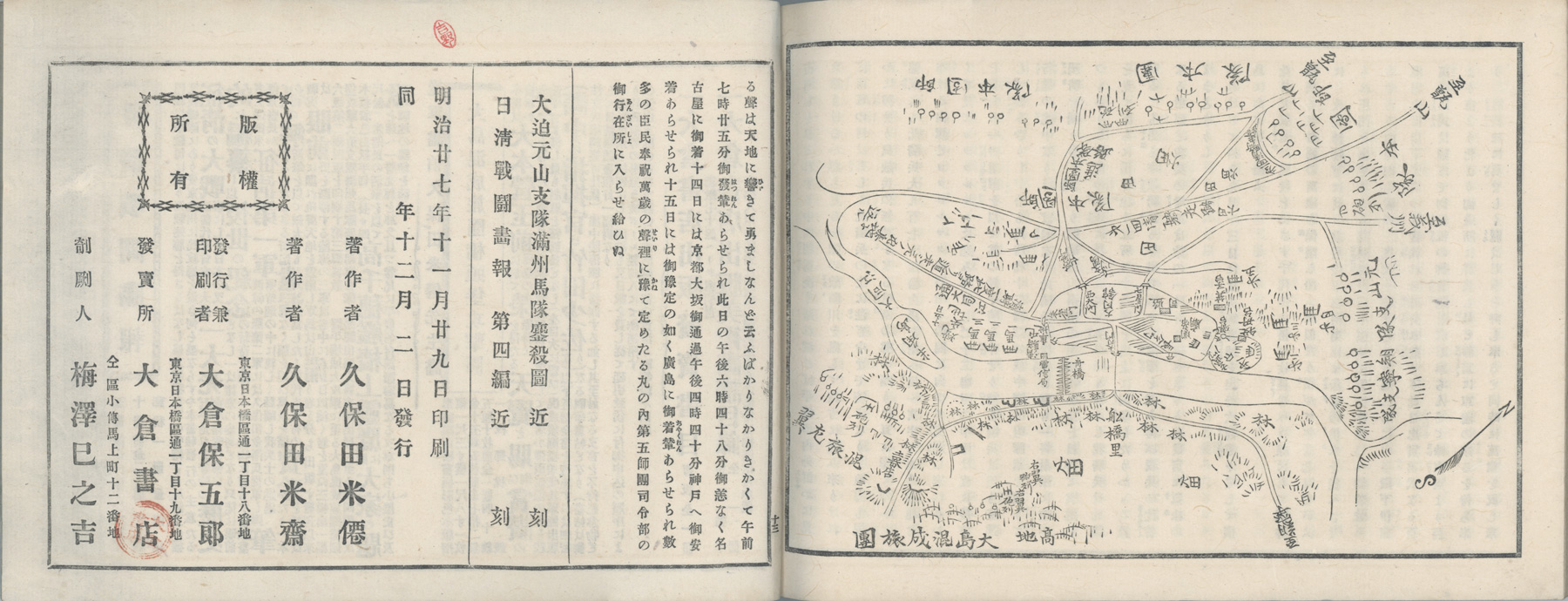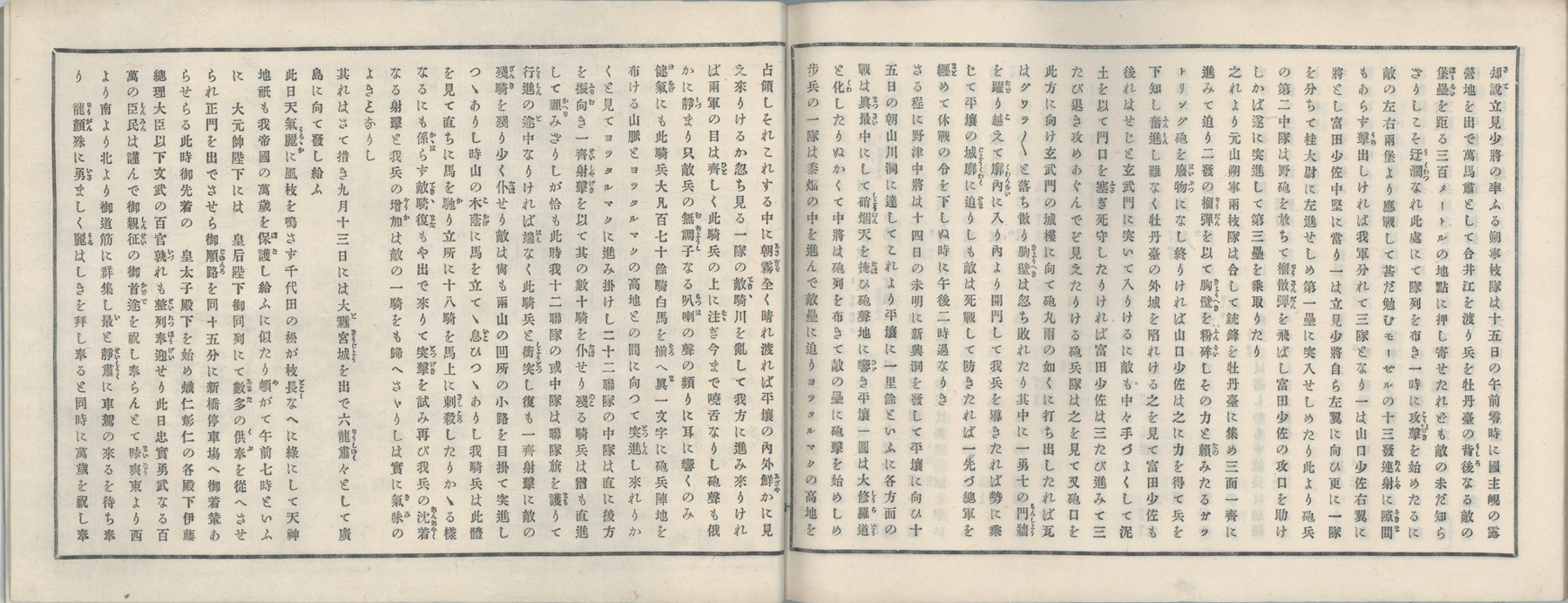About This Book
Volume 3 of a total of eleven bound volumes1 forming a pictorial account of the first Sino-Japanese War, from its outbreak in the summer of 1894 to Japan's sea-victories at Weihaiwei, Japan's advance into Manchuria and finally the peace treaty ending the war in April 1895. The eleven volumes were published at irregular intervals between October 21st 1894 and June 6th 1895. Each volume has an introduction written by a well-known figure of the time. The books were produced from carved woodblocks and are bound in the usual method of "bound-pocket books" (Fukuro toji 袋綴じ). Volumes 5 through 11 have English captions above the illustrations.
The illustrations in these books were widely dispersed overseas to an audience closely following the war, as can be seen from the below illustrations from Volume 6 that appeared in the 1895 French publication Revue Encyclopédique: Recueil Documentaire Universel et Illustré, published by Georges Moreau in Paris.
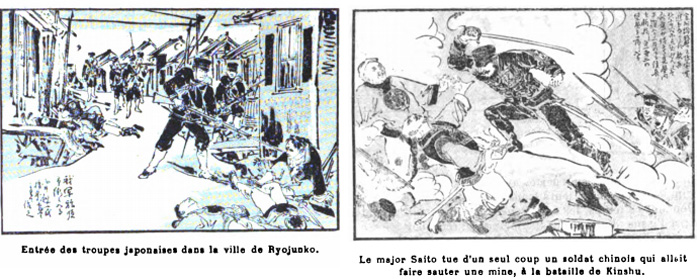
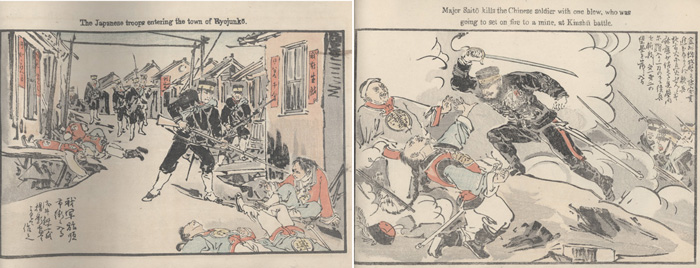
Images as they appear in Volume 6 of Illustrated Account of the Sino-Japanese War
Source: Japan at the Dawn of the Modern Age – Woodblock Prints from the Meiji Era, Louise E. Virgin, Donald Keene, et. al., MFA Publications, 2001, p. 68.
"A unique and important source of inspiration for the Sino-Japanese War print artists was the journalistic reports written and illustrated by the Kyoto painter Kubota Beisen (1852-1906). Accompanied by his two sons, Beisai and Kinsen, Beisen actually followed the troops [the First Army division] and recorded their battles in words and sketches. And Beisen himself was depicted almost as a war hero in a small number of triptych designs." (See the print Ban-Banzai for the Great Japanese Empire! Illustration of the Assault on Songhwan: A Great Victory for Our Troops.)
Source: A Much Recorded War: The Russo-Japanese War in History and Imagery, Fredrick A. Sharf, Anne Nishimura Morse, Sebastian Dobson, MFA Publications, 2005, p. 40-41.
"In their ten-volume2 Illustrated Record of the Battles of the Sino-Japanese War, from 1894-95, Beisen and his two sons describe the events of the war against a landscape this is beholden to East Asian literati painting and prints, with fibrous texture strokes used to define mountainsides and riverbanks and stippling to suggest the foliage on the trees. Yet the artists have consistently modeled the figures of the Japanese soldiers with light and darks to heighten the solidity of their forms. This modeling contrasts with the time-honored use of simple hooked outlines to define the figures of the Chinese combatants."
Source: A Much Recorded War: The Russo-Japanese War in History and Imagery, Fredrick A. Sharf, Anne Nishimura Morse, Sebastian Dobson, MFA Publications, 2005, p. 40-41.
"In their ten-volume2 Illustrated Record of the Battles of the Sino-Japanese War, from 1894-95, Beisen and his two sons describe the events of the war against a landscape this is beholden to East Asian literati painting and prints, with fibrous texture strokes used to define mountainsides and riverbanks and stippling to suggest the foliage on the trees. Yet the artists have consistently modeled the figures of the Japanese soldiers with light and darks to heighten the solidity of their forms. This modeling contrasts with the time-honored use of simple hooked outlines to define the figures of the Chinese combatants."
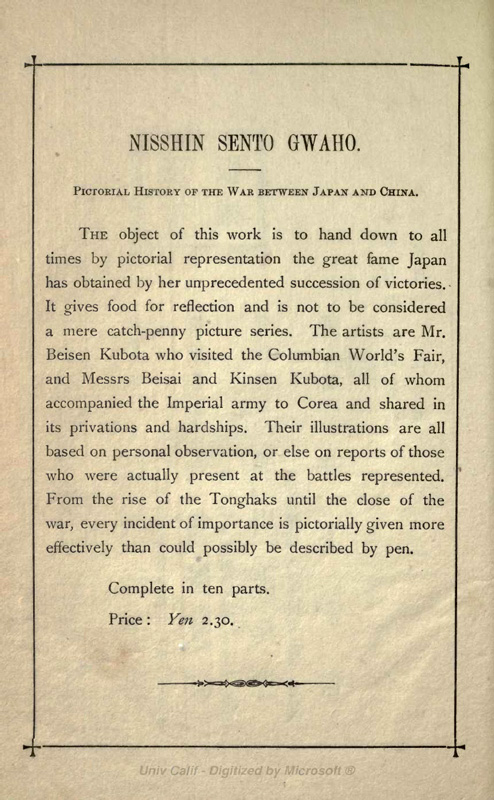
Advertisement appearing in A Concise History of the War Between Japan and China,
compiled by Jikichi Inouye, Osaka: Z. Mayekawa, Tokyo: Y. Okura, 1895.
[note: while the ad states "Complete in ten parts." an eleventh volume was added at a later date.]
compiled by Jikichi Inouye, Osaka: Z. Mayekawa, Tokyo: Y. Okura, 1895.
[note: while the ad states "Complete in ten parts." an eleventh volume was added at a later date.]
2015 Reprint of All Eleven Volumes
I n 2015, the Osaka publisher Sōgensha 創元社 reprinted all eleven volumes in a single 470 page volume with additional commentary.
n 2015, the Osaka publisher Sōgensha 創元社 reprinted all eleven volumes in a single 470 page volume with additional commentary.
Egakareta Nisshin Sensō: Kubota Beisen "Nisshin sentō gahō": eiin, honkokuban, gasha Kubota Beisen, Kubota Beisai, Kubota Kinsen ; Ōtani Tadashi, Fukui Junko hen.
描かれた日清戦争 : 久保田米僊「日清戦闘画報」 : 影印・翻刻版
I
Egakareta Nisshin Sensō: Kubota Beisen "Nisshin sentō gahō": eiin, honkokuban, gasha Kubota Beisen, Kubota Beisai, Kubota Kinsen ; Ōtani Tadashi, Fukui Junko hen.
描かれた日清戦争 : 久保田米僊「日清戦闘画報」 : 影印・翻刻版
1 Ten volumes were originally planned, but an eleventh titled 凱旋編 (Triumphal Return) was added at a later date.
2 See note 1 above.
Published on December 2, 1894, Volume 3 covers the Pyongyang campaign through the Battle of Haiyang Island.
Notes:
1. The below descriptions in Japanese are taken from the National Diet Library https://dl.ndl.go.jp/info:ndljp/pid/995304
page 4-5 序 Preface (last page)米僊田寛signed Beisen Hiroshi calligraphy 米斎?書 Beisai宮中大本営御前会議図Imperial Council at Imperial General Headquarterspage 2-3 序 Preface (continued)page 1 序 Preface
with unread seal of Kubota Beisen
page 10-11
青石関我斥候兵図
瑞興府使洪鐘淵を縛す図
page 16-17
斥候兵単身敵兵を走らす図
駒峴に於清兵同志討図page 12-13 瑞興府夜警図皇軍黄州城占領図
page 22-23
大迫満州馬隊鏖殺図page 20-21
大島旅団橋頭堡攻撃図page 18-19 我軍敵の四面を囲み平壌攻撃図
page 26-27
山県大将京城出発迎恩門を過る図
歴史記事
Historical accountpage 24-25
朔寧支隊玄武門牡丹台劇戦図
page 34-35
歴史記事
Historical accountpage 32-33 歴史記事Historical accountpage 30-31 Historical account
page 40
國民新聞
從軍特派員久保田米僊仝米齊畫
Kokumin shinbun
Special military correspondents Kubota Beisen and Kubota Beisaipage 38-39
平壌戦地図 大島滉成旅團
Pyongyang battle map including the journey of Ōshima's brigade
colophon明治廿七年十一月廿九日印刷明治廿七年十二月二日發行著作者 久保田米僊著作者 久保田米齊発行兼 印刷者 大倉保五郎発行所 大倉書店剞劂人 梅澤巳之吉printed on November 29, 1894published on December 2, 1894writer Kubota Beisenwriter Kubota Beisaipublisher and printer Ōkura Yasugorōpublishing house Ōkura shotencarver Umezawa Minokichi
Book Details
| IHL Catalog | #1627 |
| Title/Description | Illustrated Account of the Sino-Japanese War, Volume 3 日清戦闘畫報* 第三編 (Nisshin Sentō Gahō, daisan hen) *typically seen written as 日清戦闘画報 [also written as 日清戰鬪畫報 and 日清戰鬥畫報] |
| Artist |  著作者 久保田米僊 [author Kubota Beisen] 著作者 久保田米齊 [author Kubota Beisai] |
| Signature | illustrations not signed unless noted on above thumbnails |
| Seal | illustrations not sealed unless noted on above thumbnails |
| Publication Date | December 2, 1894 明治廿七年十二月二日發行 (printed on November 29, 1894) |
| Edition | |
| Publisher | Ōkura Yasugorō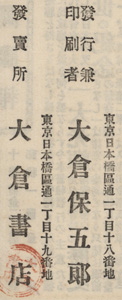 detail from colophon detail from colophon発行兼 印刷者 大倉保五郎 [publisher and printer Ōkura Yasugorō] 発行所 大倉書店 [publishing house Ōkura shoten] |
| Carver | Umezawa Minokichi [carver Umezawa Minokichi] |
| Printer | Sugihara Benjirō 杉原辨次郎 [note: although the printing of the first three volumes is attributed to Sugihara, he is not listed as the printer in the colophon until volume 4 when his place of business 杉原活版所 Sugihara kappanjo (Sugihara print shop) is also listed. The colophon of this volume lists Ōkura Yasugorō, the publisher as the printer.] |
| Impression | excellent |
| Colors | excellent |
| Condition | excellent |
| Miscellaneous | |
| Genre | ehon 絵本; senso-e |
| Format | fukurotoji |
| H x W Paper | 6 11/16 x 9 1/4 in. (17 x 23.5 cm) |
| Collections This Book | Museum of Fine Arts, Boston 2000.338 (Volume 3); Victoria & Albert Museum E.2531-1925 (volumes 1-5 and 8); Rijksmuseum Netherlands RP-P-2005-594; Japanese Special Collection in Sterling Memorial Library at Yale University, ID #1121 (Volume 3); UCLA Libraries and Collections Record ID 2035932 (Volumes 1-3); University of Chicago Library Call No.: J6289.2 2269 (Volumes 1-3); Cornell University Library call number Asai Rare DS765.K95 (Volumes 1-11); Williamsburg Research Libraries Partnership Swem Library DS765 .K82 v.1 (Volumes 1-11); Columbia University Libraries East Asian SPECIAL COLL. DS765.K82 1894 (Volumes 1-11); Brown University Library Hay MilitaryDS765.K83x 1894 (Volumes 1-8); Harvard University HOLLIS: 007566215 (Volumes 1-11); National Diet Library (Volumes1-3, 6, 8); National Institute of Japanese Literatue (volumes 1-11); St. Louis Museum of Art 854.2010, 855.2010, 848.2010 (Volumes 4, 5, 8) |
| Reference Literature | Japan at the Dawn of the Modern Age – Woodblock Prints from the Meiji Era, Louise E. Virgin, Donald Keene, et. al., MFA Publications, 2001, ill. 23, p. 63; In Battle's Light: Woodblock Prints of Japan's Early Modern Wars, Elizabeth de Sabato Swinton, Worcester Art Museum, 1991, p. 14; The World of the Meiji Print: Impressions of a New Civilization, Julia Meech-Pekarik, Weatherhill, 1986 p. 206; Conflicts of Interest: Art and War in Modern Japan, Philip K. Hu, et. al., Saint Louis Museum of Art, 2016, p. 158-160. |
page created: 5/12/2020


